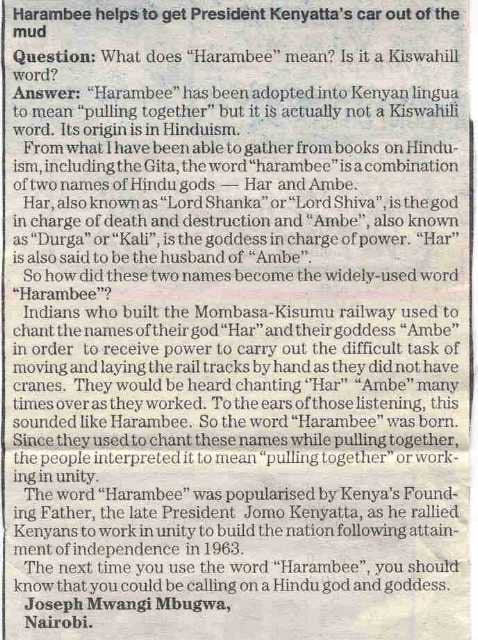
The Indian Origin of Harambee by Joseph Mwangi Mbugwa
Harambee helps to get President Kenyatta’s car out of the mud.
Question: What does “Harambee” mean? Is it a Kiswahili word?
Answer: “Harambee” has been adopted into Kenyan lingua to mean “pulling together” but it is actually not a Kiswahili word. Its origin is in Hinduism.
From what I have been able to gather from books on Hinduism, including the Gita, the word “harambee” is a combination of two names of Hindu gods – Har and Ambe.
Har, also known as “Lord Shanka” or “Lord Shiva”, is the god in charge of death and destruction and “Ambe”, also known as “Durga” or “Kali”, is the goddess in charge of power. “Har” is also said to be the husband of “Ambe”.
So how did these two names become the widely used word “Harambee”?
Indians who built the Mombasa-Kisumu railway used to chant the names of their god “Har” and their goddess “Ambe” in order to receive power to carry out the difficult task of moving and laying the rail tracks by hand as they did not have cranes.
They would be hard chanting “Har” “Ambe” many times over as they worked. To ears of those listening, this sounded like Harambee. So the word “Harambee” was born. Since they used to chant these names while pulling together, the people interpreted it to mean “pulling together” or working in unity.
The word “Harambee” was popularised by Kenya’s Founding Father, the late President Jomo Kenyatta, as he rallied Kenyans to work in unity to build the nation following attainment of independence in 1963.
The next time to use the word “Harambee”, you should know that you could be calling on a Hindu god and goddess.
Joseph Mwangi Mbugwa,
Nairobi.









